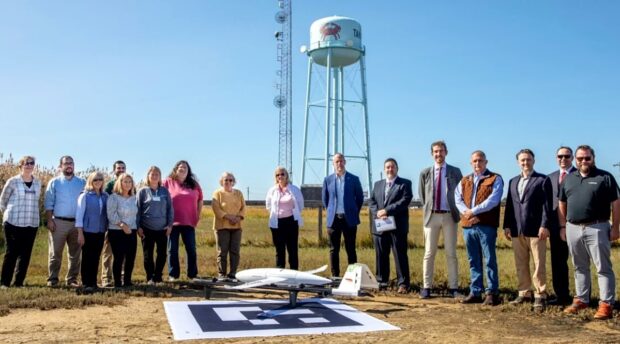On October 25th. the Elevating Health Care Access project hosted a live demonstration of the cutting-edge Kite B drone: a vehicle that can safely and quickly deliver lifesaving medications to rural Virginia. This event introduced Tangier Island residents to the groundbreaking project, which aims to improve health care access for hard-to-reach areas like theirs—where patients often endure delays due to transportation challenges.
The event also celebrated the completion of the Stage I goals for the project, funded through the federal SMART Grant research program. It concluded months of test flights by DroneUp, an American autonomous drone delivery company, which successfully reduced delivery times to this remote region. In just 16 minutes, a drone made the 17-mile flight from Riverside Shore Memorial Hospital (RSMH) on the Eastern Shore, simulating how medication and medical supplies can be transported via drone, and landed at Riverside Tangier Medical Center on Tangier Island. On the return flight, the drone simulated the transportation of routine lab work back to RSMH for testing.
“We are immensely proud of the planning, dedication and hard work that have gone into this project and culminated in today’s event,” said Nick Chuquín, president of Riverside Shore Memorial Hospital. “This technology not only enhances our capacity to meet urgent health needs but also represents a significant advancement in ensuring equitable health care access for all our residents, not only on the mainland of the Eastern Shore, but also on Tangier Island.”
“The culmination of Stage I was a significant step, ultimately showing that the 17-mile Beyond Visual Line of Sight flight is a viable option for delivering medical supplies. We know that drone delivery to patients in rural areas will not only improve access to medications, but also improve patient outcomes and overall health,” said Tom Walker, CEO of DroneUp. “We’re proud to have worked with Riverside Health and all of the other partners as part of the first phase of the Elevating Health Care Access SMART Grant program. As we move into the next phase of the program, we’ll build out components of the DroneUp Ecosystem to drive, scale, reach, and streamline the business adoption process.”
The Virginia Innovation Partnership Corporation (VIPC) has supported this project since its inception nearly two years ago.
“The island’s remote location in the Chesapeake Bay creates significant hurdles for delivering medical services. This initiative showcases how the power of innovation can overcome the challenges of distance and time, providing urgent and potentially life-saving medical care for Tangier’s residents,”
said Joe Benevento, president and CEO of VIPC.
A Promising Pilot
Elevating Health Care Access grew from a need in remote populations, who have long faced challenges with obtaining timely access to health care and needed treatments. Its pilot efforts were focused on Tangier Island and Virginia’s Eastern Shore—which showed great potential to transform the delivery of critical medication, supplies and lab work to and from other rural communities.
“There is always a gap between urban and rural. In Stage I, we successfully found another way to bridge it,”
said Elaine Meil, executive director of the Accomack-Northampton Planning District Commission.
“The successful proof-of-concept flight is a testament to the hard work and vision that went into developing a strategic plan for using drone operations to serve Tangier Island, the most remote community in our state,” said Juan Pablo Segura, Chief Deputy Secretary of Commerce and Trade of Virginia. “The team’s dedication to overcoming the logistical challenges of rural health care delivery is inspiring, and their efforts are now paying off with innovative solutions that reduce delivery times and improve access to vital medical supplies. The Commonwealth of Virginia is proud to have supported this groundbreaking work, and we look forward to its continued success.”
What’s Next
Elevating Health Care Access submitted the Stage 2 SMART Grant proposal this summer, with the hope of receiving approval in early 2025. Following approval, the project will begin scaling up efforts to operationalize this capability for the benefit of residents on the Eastern Shore and those on Tangier Island.
The project’s goal is to develop an operational prototype that will evolve into a self-sustaining public transportation service for vulnerable, underserved communities on the Eastern Shore and Tangier Island—significantly improving health care outcomes.
“The Stage I success clearly shows that the technology is ready to scale and reduce transportation times of medicines, medical supplies and test results to and from Tangier Island and other remote locations on the Eastern Shore of Virginia and Maryland from days to hours,”
said John Costulis, the SMART Grant medical package delivery project manager at Old Dominion University.
The airspace analysis report can be accessed here.
Source: Shore Daily News


